
Welcome to the ezine produced by SGI Buddhists that prompts the positive, kindles the constructive, highlights the hopeful and leaves you feeling - well, up!

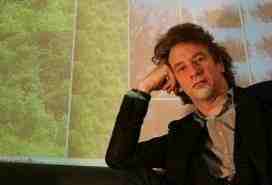
When philosopher Hilary Lawson set up the largest philosophy and music festival in the world, his plan was to create a space where people could explore big ideas and have open conversation with each other.
Interview by Louise Ellis
What recurrent thought led you to set up the philosophy and music festival – HowTheLightGetsIn?
When we set up HowTheLightGetsIn, philosophy in the UK had an image which was rather laughable, like a Monty Python football match where neither team manages to kick the ball. It had become very narrow, primarily focussed on analysis of how language works, with no bearing on people’s lives.
The public space we inhabit has very little genuine communication or thought. In France it is very normal to have a philosophical conversation with a taxi driver on the way to the hotel. But in the UK, to talk about big ideas invites ridicule. It is not the done thing to be too serious.
I’ve always lived and breathed philosophy, questioning what it is to be alive. How can you get by without asking those questions? We wanted to change the culture in the UK of embarrassment about discussing big ideas. We wanted to make philosophy relevant to people’s lives.
The festival is a space where people can explore the big questions of life, and communicate in an open way with each other. Very little of our culture functions like this - rather than having open conversation - it is just about trading opinions.
The name of the festival is taken from the lyrics of a Leonard Cohen song – ‘there is a crack in everything – that's how the light gets in.’ So the idea is that if you challenge things – see what is the matter with it – then that is where you get the light.
How is HTLGI different from other festivals?
From the outset we led with ideas. The programme is centred on debates rather than talks. There are lots of famous names in our programme, but we are not
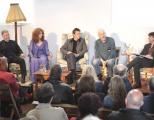
celebrity hounds, we are ideas hounds.
There is currently a rash of literary festivals, with the business model of publishers paying to get authors infront of an audience. The publishers fund a good chunk of the festival, which helps the whole thing work, but it turns the literary festival into a marketing exercise.
We are determined not to do this. One year, a celebrity author gave a talk about his new book, with the PR person making sure he kept to the script. Afterwards, we decided we’re not going to do that again.
Each year we want to try out new ideas. We’re not standing still. Also we are slightly trouble causing, always looking for the new, what is not quite right in current thinking. We want to look at what is the matter with the way we see things – how is light going to get in – in the future.
Have you had any unexpected feedback – which has made you smile and feel you are on the right track?
We’ve grown remarkably quickly, to more than 10x the size of our first festival three years ago. This year, we have put on 490 events.
Who would believe that a philosophy festival could be so successful? It’s been a pleasure to realise that people really do value the space we are trying to generate. It proves how everyone is a philosopher, because they are alive and trying to make sense of their lives.
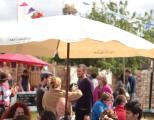
People who haven’t been to the festival, particularly panellists, might think that the audience is not very sophisticated, that they can talk down to them, but they quickly realise that is not the case – the audience brings an enormous amount of experience to the festival.
One of the reasons why we don’t have a VIP enclosure, with public in one area and speakers in another, is to encourage all our speakers to get out there, meet people, be part of festival and go to other talks.
You could find yourself talking to James Lovelock over coffee in the morning, David Blunkett over lunch, and Brian Eno in the evening – everyone is part of it.
Why did you become a philosopher?
When I was at school I studied science. However, my teachers were very disappointed when I gave it up to study philosophy at university. This was the right choice for me as it fits my way of seeing life. I like questioning things, whereas science is predominantly concerned with acquiring knowledge of what other people have done. There is very little room for manoeuvre until you get to the edges.
The scientific framework is the dominant philosophical view that most people in our culture have. The theory that we are a planet in a solar system, in a galaxy, in a universe started by the big bang – for some people this is an all encompassing truth.
It is now up to philosophy to define the limitations of this standard view of the world – that there are alternative ways of holding the world that have validity.
How would you describe your philosophical approach?
I have been described as a post-postmodernist philosopher. I’m a critic of postmodernism. I favour the postmodernist attack on the modernist notion that there is a truth, a realist way of arriving at an accountable world. However, it is no good just attacking realism, without providing a new framework of ideas. In contemporary culture, people are lost.
We can’t return to simple truths that a guru might tell us about the world, or that scientists discover in CERN. Equally, we can’t just live in a deconstructed world, a
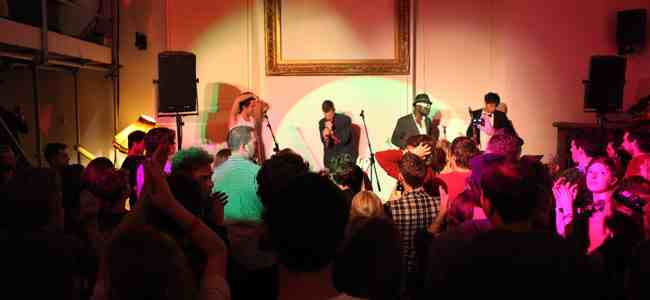
lost space.
Instead, I have tried to build a story of openness and closure. Closure describes how we make our stories of the world and how they enable us to intervene.
Many Buddhists have said to me that my theories have strong links with Buddhist thought. I know nothing about Buddhism and arrived at these conclusions through Western philosophy.
Philosophically speaking, Kant tried to build a system where he started from the view that thought provides us with knowledge. I start from the reverse position, that we don’t have knowledge about the world, and this is where there is a connection with the Buddhist perspective.
And then I ask the question, how is it possible to do all sorts of things, like land men on the moon, have this conversation, think about the nature of the universe? If we don’t have knowledge, how are we able to intervene in the world? This is the story I’m providing an account of - without ever actually arriving- and having a final account.
If you could do anything in life what would it be?
It would be - to spend more time being! It seems to me the times of life when we are most happy – is when we are being.
Thinking enables us to make plans, have goals, build houses and organise things.
However, the times that I really value are when I’m just being - in the present moment - lost in the openness of the space. The moment on a seashore as the storm is brewing and the wind is in your hair. The moment when you are playing like a child in an adult space – those are the times which are most valuable.
What quality does the world need right now to save us from the mess we are in?
There is not just one quality. We need to have humility in relation to our thoughts and beliefs, to realise they are tools to help us do things in the world, but they don’t provide us with the ultimate answer. We need to find spaces where we can be – as well as have specific goals. Then that is a very valuable place to be.
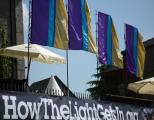
HowTheLightGetsIn runs for 10 days every May-June in Hay-on-Wye.
All events are filmed and available on the Institute of Art and Ideas (IAI) website.
The IAI organises a contemporary arts festival in November, called Crunch, also in Hay-on-Wye.
Hilary Lawson’s book, Closure – A Story of Everything - is available here.

